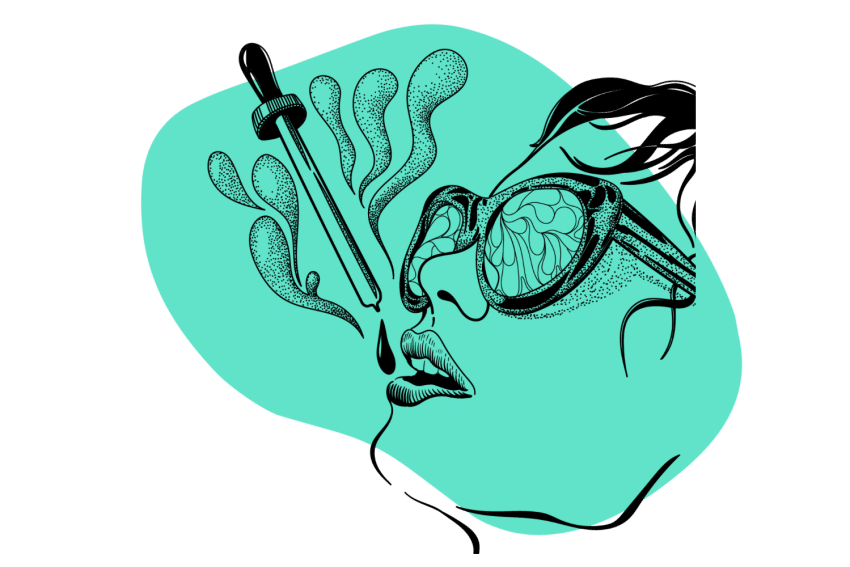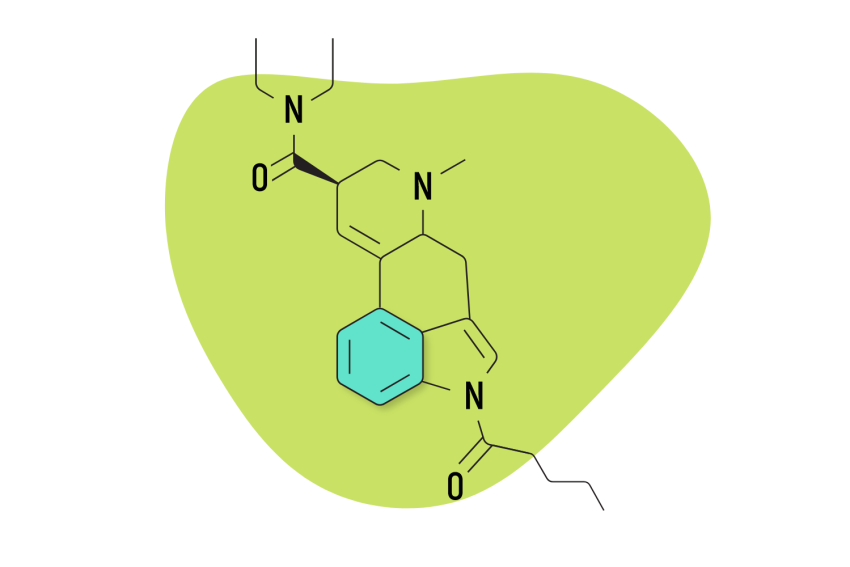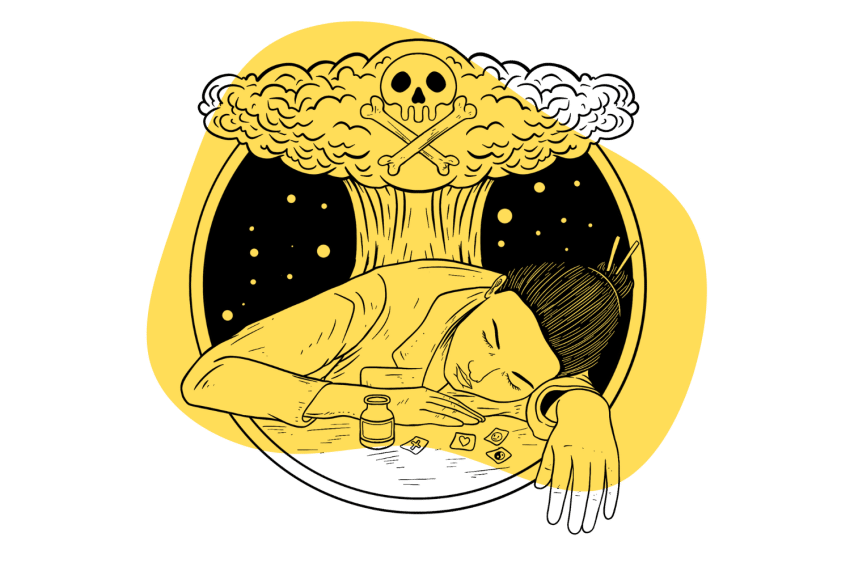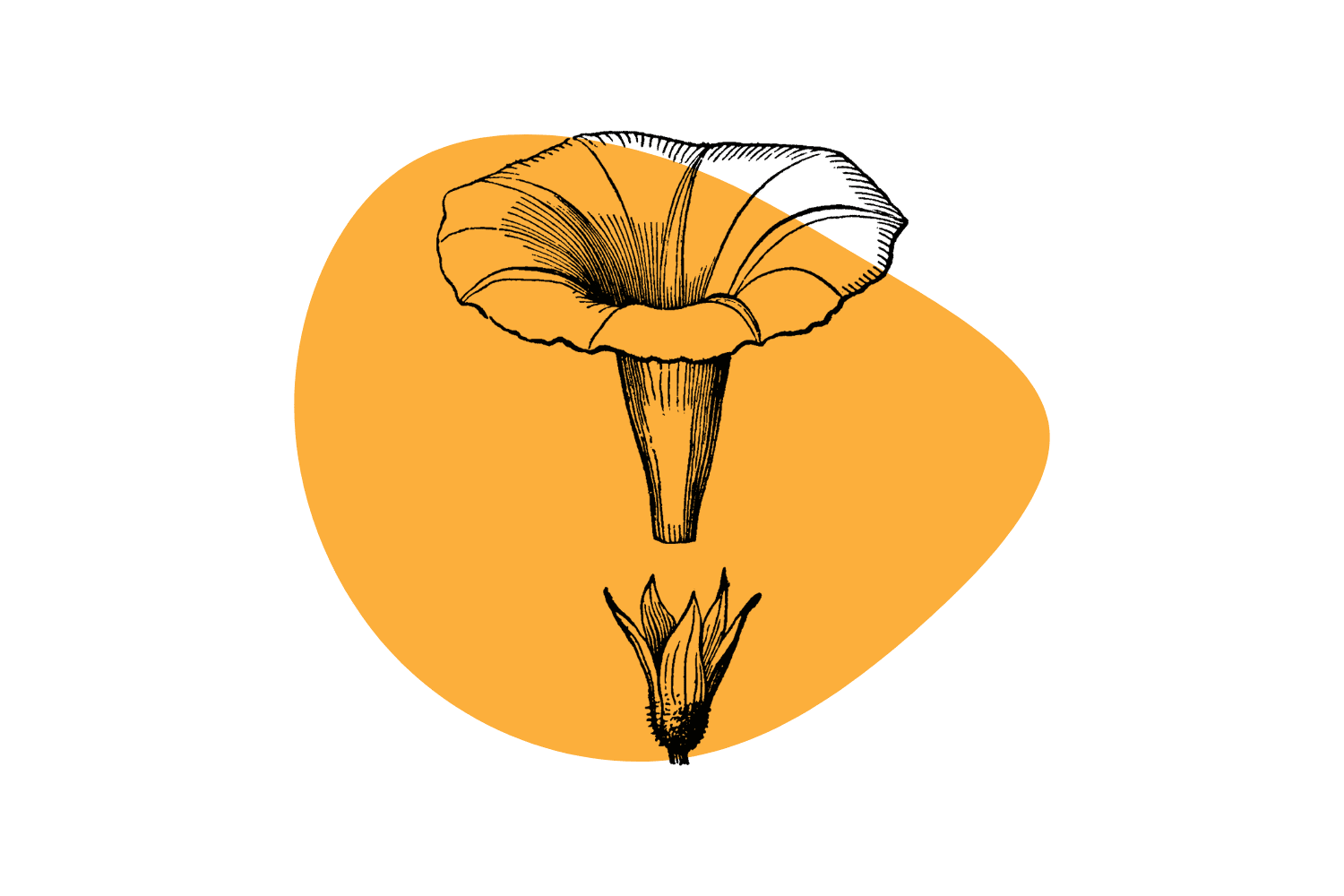What is ALD-52? Exploring This Powerful LSD Alternative
ALD-52 is a psychedelic analog of LSD and homolog of 1P-LSD.
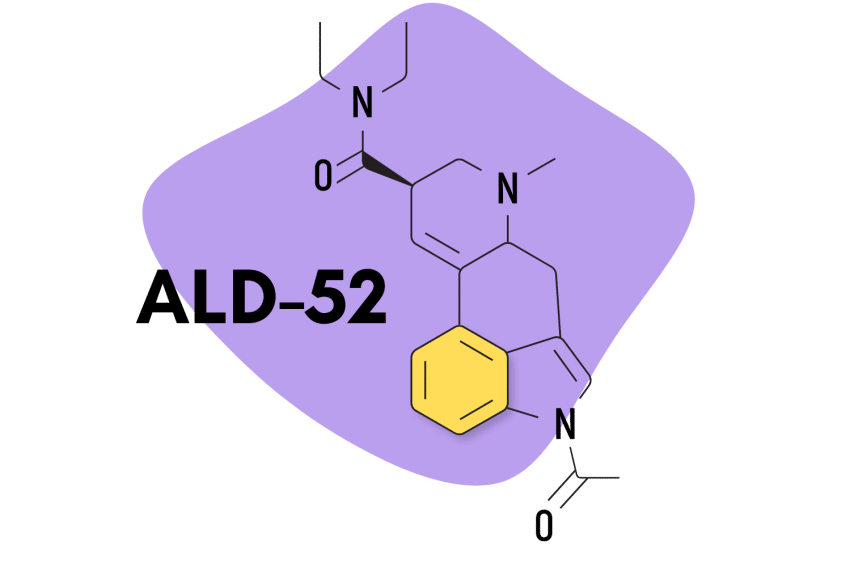
ALD-52 has been around for a long time. It was first invented in the late 1950s by Albert Hofmann — the same chemist responsible for discovering LSD and psilocybin.
ALD-52 didn’t become popular until the late 1960s when a rumor started circulating within California that claimed a particularly strong batch of acid known as Orange Sunshine contained ALD-52 instead of LSD (this was later debunked).
Today, ALD-52 is common in the underground psychedelic scene as an alternative for LSD. It’s often used as a milder, gentler form of acid, but the effects are virtually identical.
What is ALD-52?
ALD-52 is a lysergamide psychedelic, a homolog of 1P-LSD.
Just like 1P-LSD, ALD-52 is a prodrug for LSD-25 (lysergic acid diethylamide), which means it must be metabolized to LSD before it can produce any of its psychedelic effects.
The chemical name for ALD-52 is 1-acetyl-N,N-diethyllysergamide (shortened to 1-acetyl-LSD or 1A-LAD). The only difference between ALD-52 and 1P-LSD is the presence of an acetyl group rather than a propionyl group. It’s unclear how this subtle difference affects how these two molecules interact with the body.
The effects of ALD-52, 1P-LSD, and LSD are virtually identical. ALD-52 and 1P-LSD are considered slightly weaker and have a slower come-up — which is likely the result of their need to be metabolized by the liver before they become active.
Most of the ALD-52 is converted to LSD within a few minutes of being absorbed, but some is converted to other compounds, such as N-demethyl ALD-52 and N6-demethyl ALD-52 (nor-ALD-52).
This loss is likely what accounts for the slightly milder potency of ALD-52 compared to LSD (roughly 20% weaker when used at the same dose).
It’s common for vendors to sell ALD-52 as LSD or other lysergamides.
Fortunately, none of the known lysergamides are toxic, and all carry very similar effects profiles. Nevertheless, it’s wise to test your ALD-52 tabs before taking them to make sure you know exactly what you’re using.
Other common lysergamides related to ALD-52 include LSZ, AL-LAD, PRO-LAD, ETH-LAD, 1P-ETH-LAD, 1cP-LSD, 1B-LSD, 1V-LSD, LSA, and more.
ALD-52: Specs & Technical Details
| Active Ingredient | 1-acetyl-N,N-diethyllysergamide |
| Level of Risk | Low |
| Other Names | 1A-LAD, 1A-LSD |
| Most Common Side-Effects | Anxiety, paranoia |
| Duration of Effects | 7–10 Hours |
| Legality | Illegal in most countries |
Guidelines for the Responsible Use of ALD-52
- 🐍 I understand why psychedelics should be treated with respect
- ⚖️ I’m familiar with the laws for ALD-52 in my country
- 🍄 I’m familiar and confident in the dose I’m taking (dose range for ALD-52 is 50–200 mcg)
- 🧪 I’ve tested a sample of the substance I’m using with a drug testing kit
- 💊 I’m not mixing any medications or other substances with ALD-52
- 🏔 I’m in a safe & comfortable environment with people I trust
- 🐺 One of the members of my group is responsible and sober (AKA a trip sitter)
- ⏳ I have nothing important scheduled for after the trip
- 🧠 I’m in a sound & healthy state of mind
- 📚 I’m familiar with the four pillars of responsible psychedelic use — set, setting, sitter, & substance.
- ⏳ Know the timeline — the effects of ALD-52 can last between 7 and 10 hours
- 🙅♀️ Know when to avoid lysergamides — don’t take ALD-52 if you have underlying heart, neurological, or psychiatric disorders
What’s the Dose of ALD-52?
The dose of ALD-52 is roughly identical to that of LSD or other lysergamide psychedelics. The usual range is around 20 mcg for a microdose, up to 200 mcg for a heroic or large dose.
The most common psychoactive dose (the dose found on one tab of ALD-52) is 80 mcg.
If using ALD-52 for the first time, it’s wise to stick to just one tab at a time and to remain patient, even if it feels like it’s taking a long time to kick in. Problems are much more likely to arise when people become impatient, and double-up on the dose — only to have both tabs kick in shortly after, resulting in an uncomfortable and overwhelming experience.
Here’s a more detailed breakdown of the doses for ALD-52:
- Microdose — 10–20 micrograms
- Threshold Dose — 25–50 micrograms
- Standard Psychoactive Dose — 70–140 micrograms
- Heroic Dose — 200–400 micrograms
Like other psychedelics, tolerance to ALD-52 happens quickly. If using the drug two days in a row, you’d need to take a significantly higher dose on the second day in order to make up for this tolerance.
Check out our handy LSD tolerance calculator to get a rough estimate of how much ALD-52 you’d need to match the intensity of effects on a second or third dose.
This calculator is only able to provide an estimate. Please do not be deceived by the apparent precision of the numbers. For the best experience, let 2 weeks pass between each trip, tolerance should be back to normal after 14 days.
What Does ALD-52 Feel Like?
The effects of ALD-52 are virtually identical to LSD. This is because ALD-52 itself isn’t thought to be psychoactive. It’s converted in the liver to LSD, which then exerts the characteristic psychedelic effects.
Because of some inefficiencies with the conversion of ALD-52 to LSD, this compound is slightly milder than LSD itself and takes longer to kick in. Many people who take ALD-52 enjoy its milder, gentler nature. The come-up of ALD-52 is smooth and steady and far less likely to cause users to experience come-up anxiety. Users are able to adjust gradually to the changes in headspace this compound induces, which reduces the chances of experiencing a bad trip.
High doses of this compound are still going to produce powerful psychoactive effects and can be just as jarring as any other lysergamide, including LSD.
It’s estimated that ALD-52 is roughly 20% milder than LSD taken at the same dose, so it still doesn’t take much for the effects of ALD-52 to become overwhelming.
Also see: What Does LSD Feel Like?
How Long Does ALD-52 Last?
ALD-52 starts to kick in about 45 minutes after taking it, peaks around 2 hours later, and lasts a total of 7–12 hours.
This is comparable to the amount of time LSD lasts, which is around 10 hours on average (give or take 2-3 hours, depending on the dose).
Factors including the dose, weight, and metabolic rate can all affect the amount of time ALD-52 or related lysergamides remain active.
Because of the need for ALD-52 to be metabolized into the active form, expect ALD-52 to take slightly longer to kick in compared to LSD and last slightly longer. The difference is subtle, and some users report no noticeable difference in the duration of effects using ALD-52 compared to LSD.

How Strong is ALD-52?
ALD-52, along with other members of the lysergamide class, are among the strongest psychedelics known.
While it’s not as likely to produce out-of-body experiences as compounds like N,N,DMT, or 5-MeO-DMT, even in high doses, the active dose is significantly smaller. The threshold dose for ALD-52 is around 30 mcg compared to around 5 mg for DMT (5000 mcg).
ALD-52 vs. LSD
ALD-52 is considered slightly weaker than LSD (lysergic acid diethylamide) when used at the same dose. The effects of ALD-52 take longer to kick in, which makes the come-up much easier to handle, especially for new users.
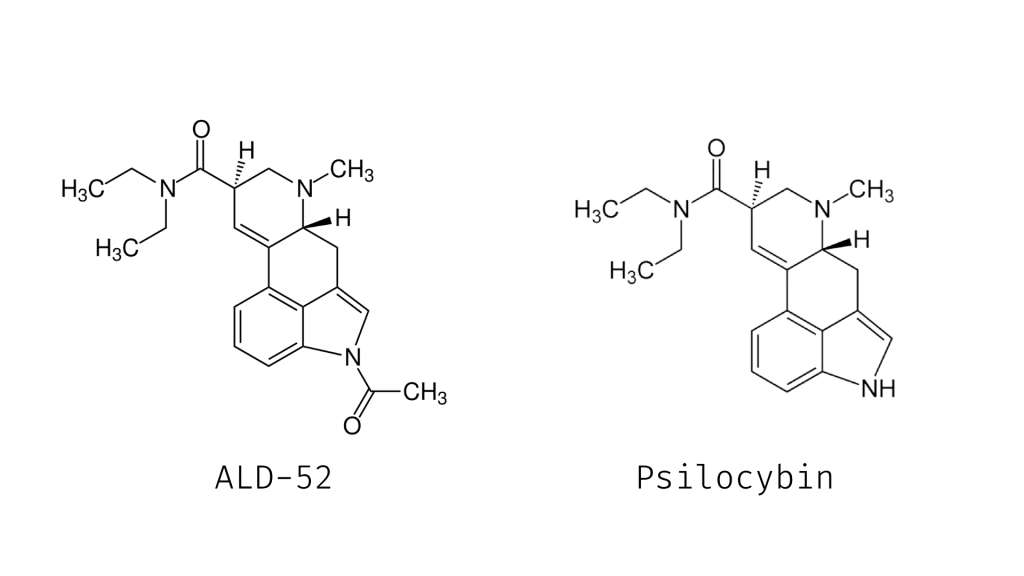
Overall, the effects of ALD-52 are going to be virtually identical to the effects of LSD.
ALD-52 vs. 1P-LSD
ALD-52 is a homolog of 1P-LSD (nearly identical molecular structure), and both need to be metabolized into LSD before they exert any psychedelic effects.
There’s no official research available to compare the binding capacity (a measurement for the potency of lysergamides) of ALD-52 and 1P-LSD, and both appear to metabolize at a similar rate.
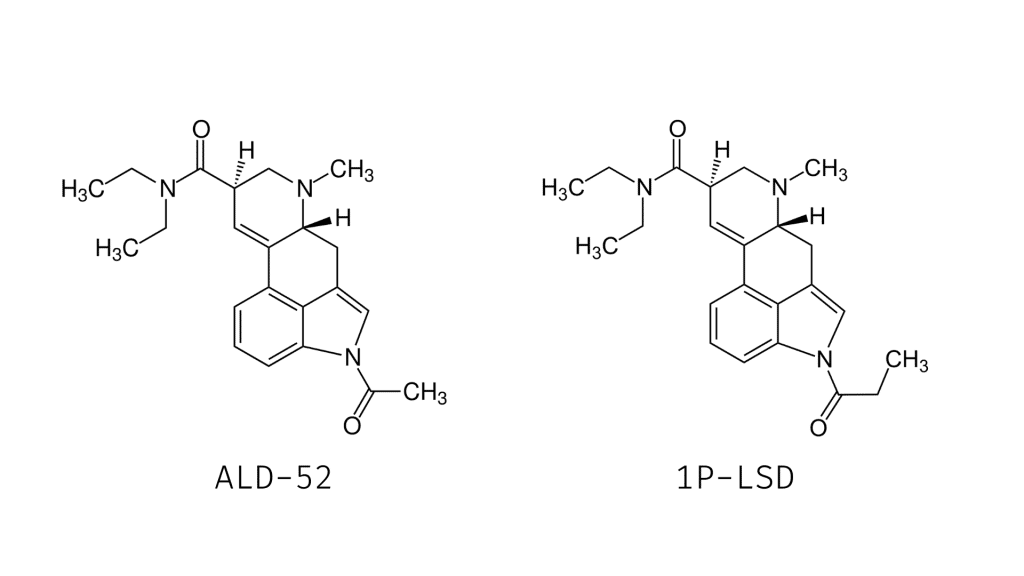
Most people who have used ALD-52 and 1P-LSD note a lack of clear differences between the two — both in terms of onset, potency, and duration of effects.
Anecdotally, some users report ALD-52 as having a stronger body high and less visual effects than 1P-LSD — but there are a lot of contradicting views on this.
ALD-52 vs. Magic Mushrooms
ALD-52, like all lysergamides, is a lot more cerebral than magic mushrooms but generally produces the same sort of effects. LSD and psilocybin (the active ingredients in magic mushrooms) both activate the same receptors and deliver more or less the same set of effects.
Subtle character differences between ALD-52 and psilocybin include:
- Psilocybin has a stronger body load than ALD-52.
- ALD-52 has a more clear-headed feel than mushrooms.
- ALD-52 lasts about 40% longer than magic mushrooms.
- ALD-52 has a milder, gentler come-up than psilocybin.
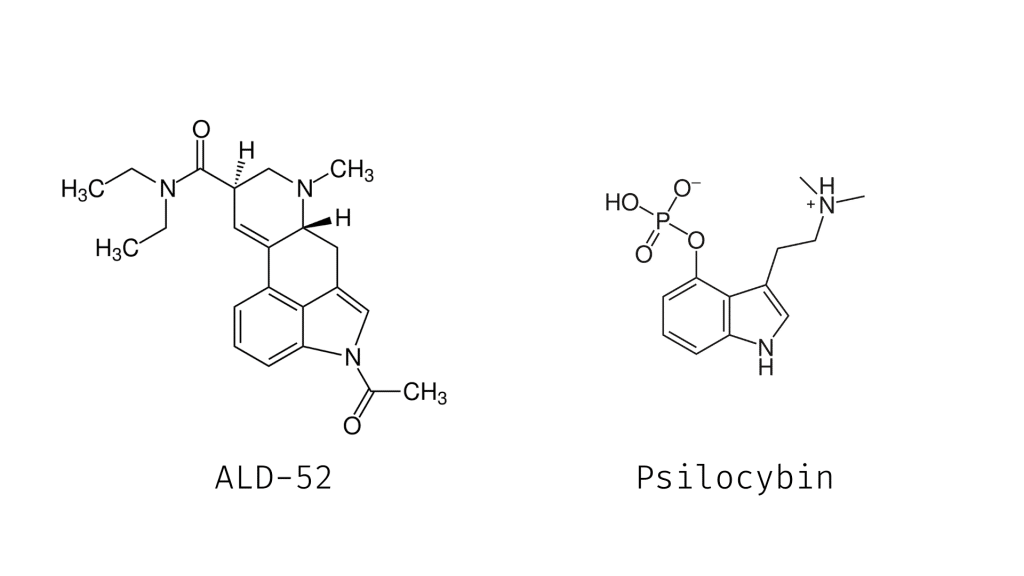
ALD-52 Safety: Risks, Side Effects, Contraindications
Overall, ALD-52 has a very low risk of causing any major physical side effects. This is common in the lysergamide family of substances, including LSD. The effects of these compounds are virtually exclusive to the mind. There are very few physiological effects, even with very large doses of the drug.
Most of the physiological changes occur as a byproduct of the cognitive effects. For example, ALD-52 can cause users to feel anxious, especially during the come-up. This results in physical changes such as increased blood pressure or heart rate.
The most dangerous aspects of using ALD-52 are the increased risk of accidental injury, reduced inhibitions, and potential adulteration with more dangerous compounds such as NBOMes.
Unlike other drugs, the dose of lysergamides is so small that adulteration with drugs like fentanyl, which are extremely dangerous, is minimized. A single tab of blotter paper doesn’t have the capacity to hold lethal doses of fentanyl. Drugs that come in powder or tablet form carry a much higher risk of causing overdose from these substances than lysergamide-based blotter paper doses.
Adulteration & Fake ALD-52
ALD-52 is reportedly one of the most common culprits for fake LSD-25 on the street. However, because of the similarities in effects, the high safety profile of ALD-52, and a tendency for providing a smoother experience, this is rarely viewed as a bad thing.
Most of the lysergamides share the same general set of effects and have comparable potency and safety profiles. Most people won’t be able to tell the difference between them.
However, another common culprit for fake LSD, as well as fake ALD-52, called 25I-NBOMe (or other NBOMe compounds), are much more problematic. NBOMe’s (N-bombs) are psychoactive in similar doses as lysergamides, but they carry a significantly higher risk for side effects and death.
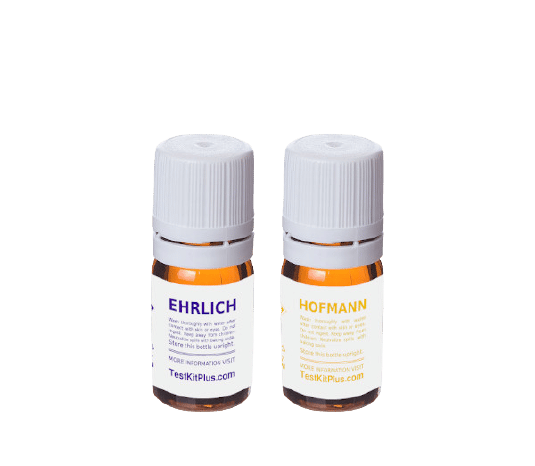
Because of these compounds, you should always test your LSD or ALD-52 tabs, regardless of how “trustworthy” the source may be.
How To Test ALD-52 & Other Lysergamides Using Drug Test Reagents
Testing your blotter papers with a chemical test reagent is fast, cheap, and very simple to perform. You only need a tiny sliver of a single tab, so you’re not going to have to sacrifice any significant amount of your substance to run the test.
To test ALD-52, you’ll need at least one reagent test substance, but two or three tests are much better to help you rule out the possibility of harmful adulterants. The main thing you’re looking for is the presence of NBOMes, which can be detected with either the Marquis or Mandelin reagents.
Most LSD-derivatives will turn purple with the Erhlich reagent, but ALD-52 is one of the few exceptions. The best way to differentiate ALD-52 from other lysergamides is to test with both the Ehrlich and the Lieberman reagents.
Here’s how to perform the tests:
1. Cut two or three small pieces off your tabs. They don’t need to be much bigger than a single grain of sand for the test to be effective. Place them on separate areas of a white ceramic plate, testing tray, or mug.
2. Place one drop of the reagent you’re testing onto the test samples. Each sample constitutes one test — do not use multiple reagents on the same test sample.
3. Wait approximately 2 minutes for the tests to finish, and take note of the color:
- Ehrlich: No reaction expected for ALD-52. If it turns purple or blue, you’re likely looking at another member of the lysergamide family, such as LSD, LSZ, ETH-LAD, AL-LAD, or PRO-LAD.
- Lieberman: Reaction should change yellow if the sample contains ALD-52. It will turn dark brown of black if the sample contains NBOMes.
- Marquis: No reaction expected. The sample will turn brown if NBOMe compounds are present.
- Mandolin: No reaction expected. The sample will turn brown if NBOME compounds are present.
Only after you’ve tested your sample should you proceed to take the tabs of ALD-52.
If your tabs fail the Lieberman test but change to a pink or purple color with the Ehrlich test, the tabs likely contain another lysergamide and should still be safe to use (at your own discretion).
Do NOT take the tabs if the Mandelin or Marquis reagents turn brown or the Lieberman test turns black. Your sample very likely contains NBOMe compounds and is therefore not safe to consume.
Research Chemicals: Lack of Safety Testing
There hasn’t been much research on ALD-52, despite how long it’s been around. From the available research, this compound appears to share the same safety profile as LSD.
Research has so far confirmed that ALD-52 is metabolized by the CYP3A4 enzymes into LSD, further processed using the CYP2D6 enzymes, and none of the other metabolites have been found to carry any toxic effects. None of these actions offer any indication that ALD-52 poses any additional risk compared to LSD (which has been confirmed to have a very high safety [1]).
However, despite these findings, there have not been any human trials with this substance, so the safety of ALD-52 remains theoretical at the present moment.
Proceed with caution.
Is ALD-52 Legal?
ALD-52 is a bit of a fringe psychedelic, which means it’s almost never explicitly mentioned on the lists of controlled substances for most countries. Therefore, ALD-52 may be legal in countries that don’t have laws banning all lysergamides, new psychoactive substances (NPS), or analogs of currently prohibited substances.
For example, neither Canada nor Denmark specifically names ALD-52 as illegal, and neither country bans lysergamides nor related analogs. This means ALD-52 is likely legal in these countries.
In the United States, ALD-52 isn’t specifically mentioned on the list of prohibited substances. However, due to the Federal Analog Act, ALD-52 is illegal because it’s an analog of LSD (Schedule I drug).
In Germany, ALD-52 is illegal under the NpSG (New Psychoactive Substances Act). The same situation is found in Austria, Latvia, Poland, and other European countries.
Countries that specifically name ALD-52 as a banned substance include Singapore, the United Kingdom, and Switzerland.
ALD-52 FAQs
1. Is ALD-52 Fake Acid?
Sometimes ALD-52 is sold as acid. In these cases, yes, ALD-52 is fake acid. However, ALD-52 is converted to LSD by the liver anyway, so the active ingredient exerting its effect on your consciousness is still the same compound.
2. What’s Safer, 1P-LSD, or ALD-52?
Both compounds are virtually identical, and there’s no evidence to suggest one is safer than the other.
Both compounds are primarily converted to LSD, with a few secondary metabolites — none of which have been found to have harmful effects.
3. Where Can I Buy ALD-52?
ALD-52 is illegal in most parts of the world, but you can buy it online in places like Canada and Denmark, where it hasn’t been banned.
No matter where you live, vendors selling ALD-52 are unlikely to be registered, so there’s always going to be a risk of getting ripped off or sold products that contain adulterants — some of which can be harmful. Always test your ALD-52 tabs before you take it, regardless of the source.
4. How Fast Does ALD-52 Turn Into LSD?
The onset of effects of ALD-52 is very similar to LSD. Some users report slightly more time for ALD-52 to kick in; others suggest no clear difference. It’s likely that individual factors can prolong the amount of time it takes for ALD-52 to take effect, but for most people, this is negligible.
Pharmacological studies have confirmed this after observing a rapid metabolism of ALD-52 into LSD in rat studies [3, 4].
5. How Common is ALD-52?
ALD-52 isn’t very common. It’s relatively hard to find this compound, even in places where it’s considered legal.
Part of the reason for this is because it’s not well known; most people are familiar with LSD but don’t yet know there’s a whole category of related compounds offering similar effects (lysergamide psychedelics).
The other reason is that in order to make ALD-52, one has to first make LSD — which is illegal. Manufacturing ALD-52 is a poor workaround to strict LSD laws found in virtually every country.
6. Is ALD-52 Orange Sunshine?
A famous batch of LSD circulating through the late 60s in California called Orange Sunshine was long believed to be made from ALD-52. These exceptionally potent blotter tabs were synthesized by legendary psychonauts of the time, Nick Sands and Tim Scully.
Nick Sands later publicly denied the claims that Orange Sunshine contained ALD-52, stating that it was, in fact, LSD-25 dosed at a particularly potent 300 µg per tab.
ALD-52 is generally considered milder than LSD, so a batch of acid containing this compound is unlikely to be as strong as the Orange Sunshine tabs were known for.
7. Will ALD-52 Show Up On A Drug Test?
Yes, ALD-52 is metabolized into similar byproducts as LSD, and there are drug tests that can detect its use [2].
However, lysergamides, including ALD-52 and LSD, don’t remain in the body for very long. LSD is detectable in blood for up to 24 hours and urine for up to 72 hours. Early studies suggest similar timelines for ALD-52 and other lysergamides.
With that said, most standard drug tests used by corporations or government agencies don’t test for LSD.
References
- Nichols, D. E., & Grob, C. S. (2018). Is LSD toxic?. Forensic science international, 284, 141-145.
- Wagmann, L., Richter, L. H., Kehl, T., Wack, F., Bergstrand, M. P., Brandt, S. D., … & Meyer, M. R. (2019). In vitro metabolic fate of nine LSD-based new psychoactive substances and their analytical detectability in different urinary screening procedures. Analytical and bioanalytical chemistry, 411(19), 4751-4763.
- Halberstadt, A. L., Chatha, M., Klein, A. K., McCorvy, J. D., Meyer, M. R., Wagmann, L., … & Brandt, S. D. (2020). Pharmacological and biotransformation studies of 1-acyl-substituted derivatives of d-lysergic acid diethylamide (LSD). Neuropharmacology, 172, 107856.
- Coney, L. D., Maier, L. J., Ferris, J. A., Winstock, A. R., & Barratt, M. J. (2017). Genie in a blotter: A comparative study of LSD and LSD analogues’ effects and user profile. Human Psychopharmacology: Clinical and Experimental, 32(3), e2599.




